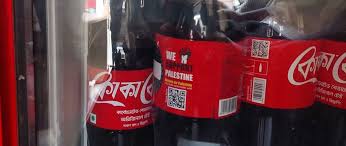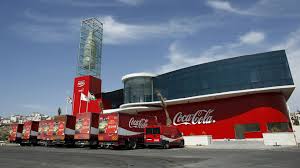Media trainer and communicator Frank Krishner breaks down Coke’s latest foot-in-the-mouth PR gaffe.
The Perils of Miscommunication
In a world where every word and action can be scrutinised, twisted, and amplified across continents, big brands like Coca-Cola need to tread carefully. A recent PR disaster in Bangladesh has shown just how quickly things can go wrong when companies fail to navigate the complex web of global sensitivities.
This summer, even as Coca-Cola sales took a nosedive across parts of the Middle East and Asia due to boycotts linked to the company’s alleged ties with Israel, the beverage giant attempted a bold move. The brand’s Bangladeshi franchise launched a high-profile advertising campaign, enlisting Sharaf Ahmed Jibon, a beloved TV star known for his roles in South Asian soap operas, to help sway public opinion.
Jibon played the role of a shopkeeper in a bustling Bangladeshi market, confidently assuring customers that Coca-Cola was not an Israeli product. He even pointed out that “Even Palestine has a Coke factory,” convincing the sceptical onlookers to cast aside their political concerns and enjoy the satisfaction of the ‘real thing’.
The Fallout
However, the feel-good narrative had a glaring flaw. The so-called “Palestinian factory” was actually an Israeli-owned bottling plant located on a controversial Israeli settlement in East Jerusalem—territory considered illegal under international law. The advertisement’s misleading claim quickly backfired, sparking outrage and deepening the anger against Coca-Cola.
The company was forced to pull the ad from all platforms, but the damage had been done. Scott Leith, Coca-Cola’s Vice President for Global Strategic Communication, issued a public apology, calling the campaign a “regrettable mistake” and acknowledging that the video had “missed the mark.”
The Bigger Picture
This incident, a case study for media students and those interested in media studies, is important to note. It also highlights the precarious position of American companies who are trying to navigate the complex geo-political landscape in regions where U.S. policies, particularly in relation to Israel, are deeply unpopular.
Since the escalation of violence in Gaza, which began on 7th October, U.S. mega-brands like Coca-Cola, McDonald’s, Starbucks, and KFC have all felt the sting of consumer boycotts.
Coca-Cola’s troubles stem from its franchisee, the Central Bottling Company, operating in the Atarot Settlement Industrial Zone, located in Israeli-occupied Palestinian territory.
Omar Barghouti, co-founder of the Boycott, Divestment, Sanctions (BDS) movement, which opposes Israel’s occupation, described the advertisement as “galling” and “primitive propaganda,” accusing Coca-Cola of underestimating the intelligence of its Muslim consumers.
The Human Cost
The backlash was swift and severe, not just for Coca-Cola but also for the actors involved in the campaign. They reportedly received death threats, adding a personal dimension to the corporate misstep. One of the actors, Shimul Sharma, publicly apologised and vowed only to take on future projects that respect human rights. Sharaf Ahmed Jibon, the star of the ad, distanced himself from the controversy, stating that the commercial was “only a part” of his professional work and that he does not, and never will, support Israel.
The Bangladeshi Coca-Cola franchise, already grappling with a 23% drop in sales before the commercial aired, was left scrambling to control the damage, pulling the ad and cancelling another one that was set to launch.
Lessons Learned
The Coca-Cola fiasco serves to remind us that in today’s media-saturated world, there is no room for error.
Paul Argenti, a professor of corporate communication at Dartmouth, noted that the company’s global presence and decentralised franchise structure do not excuse such a blunder. “In sensitive situations like this, your facts have to be correct, and your communication has to be airtight,” Argenti said. He criticised Coca-Cola for being too slow to react and for not pulling the advertisement immediately once the issues were recognised.
Though this incident related to Bangladesh, ripples were felt throughout the Middle East. Coke’s blunder provided an unexpected boost for local competitors in the Muslim world, with brands like Jordan’s Matrix Cola and Saudi Arabia’s Kinza seeing a surge in sales. In some areas, the only people still drinking Coca-Cola are tourists.
Even companies that have exercised more caution than Coca-Cola have not escaped unscathed. McDonald’s faced backlash after its Israeli franchise gave away thousands of free meals to Israeli soldiers. Starbucks, too, came under fire for its perceived insensitivity to the Palestinian cause.
A Broader Trend
The rationale behind these boycotts varies, but the underlying sentiment is clear: in regions where U.S. support for Israel is deeply unpopular, American brands are increasingly seen as extensions of U.S. foreign policy.
Will Todman, a Middle East analyst at the Center for Strategic and International Studies, observed that many boycotters may not even be aware of the specific ties between these companies and Israel. “People boycott the companies because they represent the United States, and they oppose U.S. support for Israel,” he said.
As tensions continue to escalate in the Middle East, global brands must recognise that their actions, however well-intentioned, can have far-reaching consequences.
The Coca-Cola incident is a case study for the Public relations machinery for any company operating in a highly connected world where a single misstep can turn into a global crisis.



